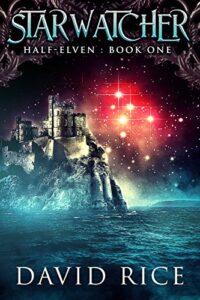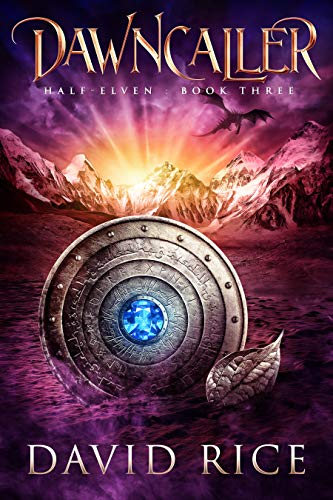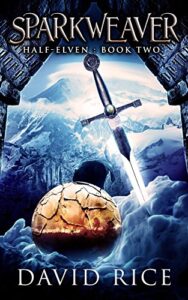
Dawncaller received a 4+ star review, making it an IndieReader Approved title.
Following find an interview with author David Rice.
What is the name of the book and when was it published?
Dawncaller, published in April of 2020, is the final book of the Half-Elven series, following Starwatcher (2016) and Sparkweaver (2017).
What’s the book about? Give us the “pitch”.
Dawncaller begins with a group of young dwarves clambering up the same steep mountain the heroine Kirsten must later conquer on her way towards the novel’s culminating moments. “Nezzil Shornedge stomped upwards through the scree of the mountain slope and wheezed as mightily as the thin air allowed.” The dwarves want to return home with some token of their worth, in this case a unique shield, and tales of bravery to fill their Holdfast for endless cycles. Kirsten needs this same shield to overcome many obstacles to save a series of homes that have rejected her as an abomination and may never know of her heroism.
Kirsten is born into a world like any other, one driven by ambitions, divided by fears, strengthened by conceits, and burdened by the expectations of family and culture, but she is born as an abomination, a forbidden child of elf and man. As Kirsten discovers the mystery of her heritage, she is overwhelmed to learn that prophecy has determined she is the only one who can stave off an apocalyptic conflict between the laws of The One and the chaotic and creative powers of the Dragons of Second Dawning. Only through the faith of others does she learn to have enough faith in herself. In the novel’s culminating moments Kirsten must decide whether to be a tool of prophecy or be true to her own values.

What inspired you to write the book? A particular person? An event?
The Half-Elven series presents cultures in conflict with one another, and characters conflicted about how they should act and who they should be. Dawncaller ties together the threads brought forward from Starwatcher and Sparkweaver and have certainly been influenced by moments of tragedy and accomplishment throughout history. Jared Diamond’s excellent study Guns, Germs, and Steel displays how a sudden crisis can forever change the world although change is seldom pretty. Similarly in Dawncaller, plague, prejudice, predatory trade, superstition, and religious dogmatism have sparked a worldwide war between proud and ambitious adversaries that could end history itself.
I’m certain that living through the profit-seeking insanity of the Cold War only to watch our species accelerate towards ecological collapse inspired me. Half-Elven presents many flawed characters who are most noble when they help preserve hope for others. Dawncaller gives readers a protagonist who, after losing family, friends, and the hope of a future can still assert that we always have a choice to contribute to the betterment of the world. And that’s an essential power we must assert.
What’s the main reason someone should really read this book?
Aside from the obvious answer that if a reader has already read Starwatcher and Sparkweaver they’ll want to know how it all ends, Dawncaller allows the reader to see that there is so much strength and goodness inspired by darker events. I hope that readers notice that the most important heroes are among us everywhere, sharing their kindness through the smallest of moments.
What’s the most distinctive thing about the main character? Who-real or fictional-would you say the character reminds you of?
For me, the most admirable quality about the protagonist Kirsten is that, despite being labelled an abomination worthy of death, she never gives up. Initially, she develops this through her father and her mentors not giving up on her. Then she must overcome crushing moments of guilt by leaning on friends who continue to believe in her even when she cannot. Finally, she faces her defining moment when the world needs her to be their salvation, and she has the self-awareness, tempered by experience, to bear the moment wisely.
I have the utmost respect for everyone who chooses to be a kind and giving soul regardless of the cruel crucible that may have preceded and shaped them. I have been constantly surrounded and inspired by friends, family, students, and mentors throughout my 56 years and am sure that characters such as Helba, Arundy, Balinor, and Dorak are tributes to the best of their examples. I would be thrilled if the courage, wisdom and noble independence of youthful leaders such as Greta Thunberg and Malala Yousafzai might be glimpsed occasionally in Kirsten Starwatcher.
If they made your book into a movie, who would you like to see play the main character(s)?
If this ever happened I would certainly trust the experienced judgement of the casting director to make the best choice, and then I would hope it would be an actor who felt a sincere and powerful connection with the burdens faced by Kirsten. Since this is a fun question to consider, I’ll throw a few names out there for the role of Kirsten: Hailee Steinfeld, Olivia Holt, Chloe Grace Moretz.
When did you first decide to become an author?
I’ve been weaving stories for as long as I can remember. The first tales I penned were comic books when I was nine years old. The first stories that looked like stories included aviation inspired adventures at twelve. I “published” my first story in our high school year book two years later and have been writing ever since.
Is this the first book you’ve written?
Dawncaller is the third book in the Half-Elven series. Before that I completed another novel (unpublished) and started many, many more from historical fiction to science-fiction.
What do you do for work when you’re not writing?
I recently retired from thirty years of teaching high school English and history. During that time I also worked for many years as an officer training Air Cadets. Since retiring, I have been occupying my time as a house hubby for my wife who is a RN, and we all appreciate how demanding that job is these days.
How much time do you generally spend on your writing?
Half-Elven was an enormous undertaking so I am letting my brain cells regenerate their creative energies and stamina. Currently I “write” RPG adventures for my gaming groups to play twice weekly via Zoom. I am in the process of turning one of our ongoing campaigns into a comic script. It’s a great way to learn a new form.
What’s the best and the hardest part of being an indie?
My first answer was going to be hacking out chunks of time to write on a regular basis. However, the hardest part is to give myself permission to write a whole bunch without stopping to edit, and then give myself permission to chop and change what’s been written after I’ve had a few days to distance myself from the initial afterglow.
What’s a great piece of advice that you can share with fellow indie authors?
Lean on a few trusted beta readers to help you edit and improve your first draft. Their eyeballs and their judgement will be priceless. And strap on your thick skin. You’ll need to hear when something isn’t working. Be patient. Stick with it. Everyone wants the book to be as good as you can make it.
Would you go traditional if a publisher came calling? If so, why?
Absolutely. Not only would they bring to the table a savvy understanding of the craft, but they would be an essential marketer of the book. I am painfully shy about marketing as an indie author.
Is there something in particular that motivates you (fame? fortune?)
At this stage, just telling a story that rings true and that others feel enriched by is enough. Anything else is gravy. And who doesn’t like a bit of gravy?
Which writer, living or dead, do you most admire?
I would love to be able to write scenes that fill your senses with splendor like in Samuel R. Delany’s Nova, write fully human characters like those in Spider Robinson’s Callahan’s Crosstime Saloon series, and write with the intelligent wit of Neal Stephenson’s Snow Crash and Diamond Age. Then I’d have to pinch myself.
Which book do you wish you could have written?
My next one. :>)

